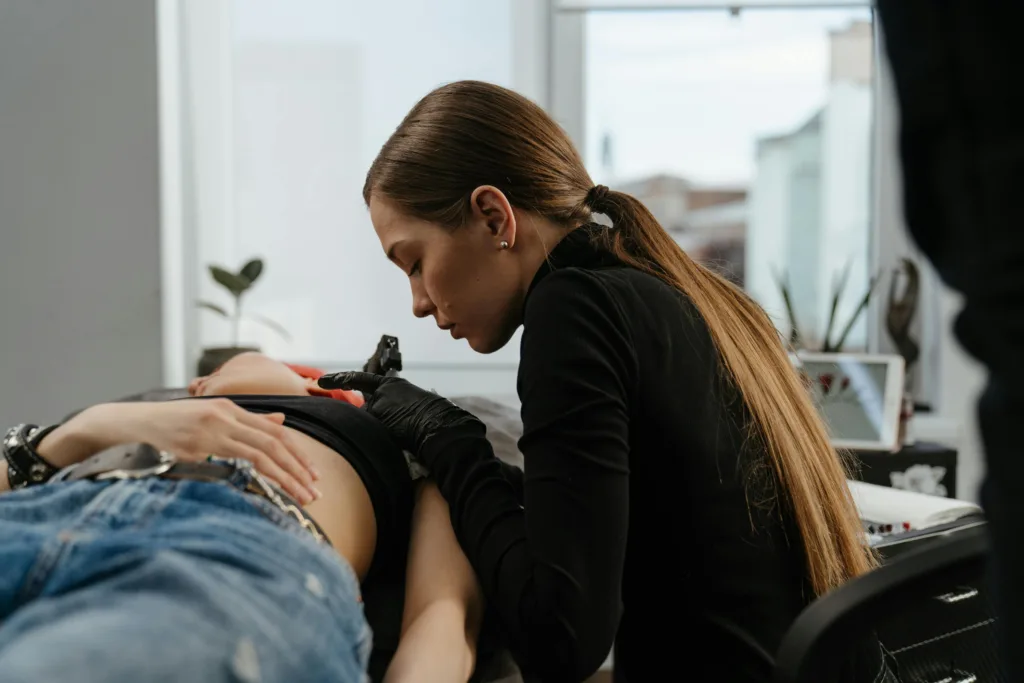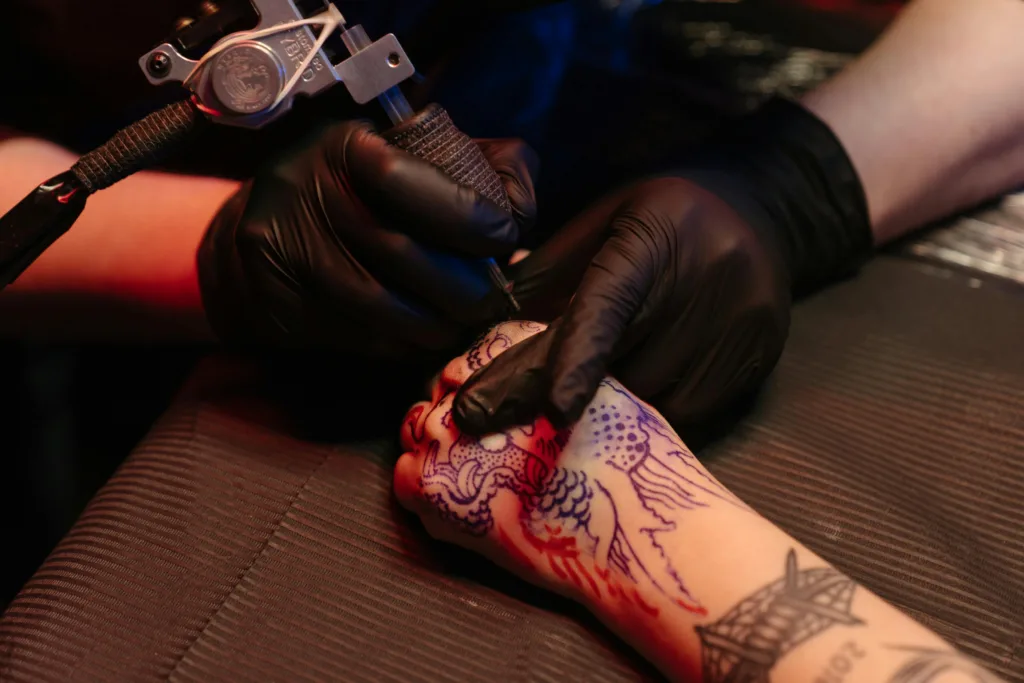Ever wondered can tattoos cause nerve damage? If those vibrant designs could potentially wreak havoc on your nerves? Well, you’re not alone.
In recent years, tattoos have become more than just body art; they’ve become a form of self-expression, storytelling. And even a way to commemorate significant moments in our lives.
As someone who’s taken the time to sift through the research, I’m here to share what I’ve uncovered about the relationship between tattoos and nerve damage.
So, sit back, relax, and allow me to shed some light on this intriguing topic.

What Is Nerve Damage?
Think of your body as a complex communication network, kind of like a big, intricate web of wires connecting different parts together.
These wires are your nerves, and they’re responsible for carrying messages between your brain and the rest of your body.
Now, when these nerves get damaged, it’s like throwing a wrench into this finely tuned machine. Imagine if some of those wires got frayed or cut—they wouldn’t be able to send messages properly, right?
That’s essentially what happens with nerve damage.
So, what does nerve damage actually feel like? Well, it can cause all sorts of weird sensations. You might experience tingling or numbness, like when your foot falls asleep.
Or you could feel sharp, shooting pains, kind of like an electrical zap. Sometimes, it can even make parts of your body feel weak or hard to move.
Think of it this way: if your nerves are the messengers, nerve damage is like giving them a bunch of mixed-up notes to deliver.
They can’t do their job properly, and that can cause a whole lot of problems.
Now, why does this matter when we’re talking about tattoos? Well, because getting a tattoo involves poking needles into your skin to deposit ink. And guess what’s right underneath your skin?
Yep, your nerves. So, it’s natural to wonder if all that poking and prodding could potentially damage those delicate wires.
Understanding the basics of nerve damage helps us see why this question is so important. It’s not just about the art on your skin—it’s about what’s going on underneath and how it could affect your body in the long run.
How Does Nerve Damage Occur?
Imagine your nerves as tiny, delicate fibers that run throughout your body, like the wiring in a complex machine.
These fibers are responsible for transmitting signals between your brain and the various parts of your body, allowing you to feel sensations and move around.
Now, there are a few ways these delicate fibers can get damaged:
- Accidents or Injuries: If you get hurt in an accident, like falling down or getting hit hard, it can hurt the wires or squish them, which messes up the messages they send.
- Doing the Same Thing Over and Over: If you do the same motion again and again, like typing on a computer all day, it can strain the wires and make them hurt, especially in your wrists or hands.
- Sickness: Some illnesses, like diabetes, can hurt the wires over time, making it harder for them to work right. Also, certain infections from germs can attack the wires directly, causing problems.
- Chemicals: Sometimes, being around certain chemicals or toxins, like at work or in the environment, can hurt the wires too, messing up how they send messages.
When these wires get damaged, it can cause all sorts of issues, like pain, numbness, tingling, or weakness in your body.
Understanding how this happens is important, especially when we’re thinking about how tattoos might affect our nerves.
How Does Nerve Damage Feel?
Imagine your nerves as little messengers running all around your body, sending important messages to your brain.
When these messengers get hurt or messed up, they can’t do their job properly, and that can make you feel some strange things.
Here’s what nerve damage might feel like:
- Tingling or Pins and Needles
- Numbness
- Pain
- Weakness
Overall, nerve damage can make you feel all sorts of strange things, and it’s not always easy to describe.
But if you’re experiencing any of these symptoms, it’s important to talk to a doctor to figure out what’s going on and how to feel better.

Do Damaged Nerves Heal?
When it comes to nerve damage, there are generally three degrees of severity. The mildest form is considered first-degree nerve damage, while the most severe is categorized as third-degree nerve damage.
The good news is that regardless of the degree of damage, nerves have the remarkable ability to heal over time.
Unless the situation is extremely serious or life-threatening, such as a severe injury, nerves can typically recover and regrow, especially with the help of surgeries if the nerves were cut.
It’s a process that takes time, though.
On average, it takes about 6 to 12 weeks for a nerve to fully recover and regrow. Nerves have a slow but steady growth rate of about 1mm per day.
After the initial injury, it may take around a month for the remaining effects of the damage to heal. So, in the worst-case scenario, you can expect a recovery period of about 2 to 3 months.
This timeline underscores the importance of patience and proper care when dealing with nerve damage.
While the process may seem slow, it’s crucial to give your body the time it needs to heal properly and to follow any treatment plans recommended by your healthcare provider.
Can Tattoos Cause Nerve Damage?
While it’s true that the tattoo needle does come into contact with nerve endings during the tattooing process, actual nerve damage is exceedingly rare.
However, it’s important to note that the depth to which the needle penetrates the skin plays a significant role in the likelihood of nerve-related complications.
Typically, deeper needle penetration increases the risk of nerve damage, particularly when handled by inexperienced tattoo artists.
Moreover, the location of the tattoo on your body also matters. Areas with thin skin and numerous nerve endings are considered high-risk zones for potential nerve damage. These sensitive areas include:
- Feet and ankles
- Elbows and the inside of the upper arm
- Inside of the wrist
- Armpits
- Hands and fingers
- Outer side of the shoulder
- Certain facial areas (like eyes, lips, and temples)
- Side of the calf and shinbone
- Behind the knees
- Ribs
- Private parts
These regions are not only more prone to nerve damage but also tend to be the most painful spots for tattooing.
Therefore, if you’re considering getting inked in one of these sensitive areas, it’s crucial to choose an experienced professional. This minimizes even the slightest risk of nerve damage or tattoo blowout.
Of all these areas, hands, feet, fingers, and toes pose the highest risk of nerve damage. Nerve damage in these regions may present as painful spasms or unpleasant sensations.
If you experience such symptoms during the tattooing process, it’s essential to communicate with your tattoo artist immediately.
They can adjust their technique or seek assistance from another professional to ensure your safety and minimize any potential nerve-related issues.
The Common Myths About Tattoos and Nerve Damage
Let’s debunk some common myths surrounding tattoos and nerve damage:
Myth 1: Tattoos cause nerve damage due to the ink itself.
Reality: The ink used in tattoos typically stays within the layers of the skin and doesn’t directly affect the nerves underneath.
Any potential nerve damage is more likely to occur as a result of the needle piercing the skin, rather than the ink itself.
Myth 2: Only large tattoos pose a risk of nerve damage.
Reality: The size of the tattoo isn’t necessarily a determining factor in whether nerve damage occurs. Instead, the risk depends more on the location of the tattoo and the skill of the tattoo artist.
Even small tattoos in sensitive areas can potentially cause nerve-related complications if not done properly.
Myth 3: Nerve damage from tattoos always leads to noticeable symptoms.
Reality: In some cases, nerve damage from tattoos may be asymptomatic or cause only mild discomfort that resolves on its own.
However, more severe nerve damage can result in symptoms such as pain, numbness, tingling, or weakness in the affected area.
Myth 4: Once nerve damage occurs, there’s no way to reverse it.
Reality: While severe nerve damage may be irreversible, many cases of nerve damage from tattoos can improve over time with proper care and treatment.
This may include techniques to alleviate symptoms, such as physical therapy or medication, as well as allowing the nerves time to heal on their own.

The Importance of an Experienced Tattoo Artist
Picking a tattoo artist with experience is super important, especially for keeping nerve damage risks low and making sure your tattoo goes smoothly. Here’s why:
Knows the Body:
Experienced tattoo artists really understand how our bodies work inside.
They know where all the sensitive bits are, like nerves, so they can avoid them when they’re doing their tattoo magic.
Does the Job Right:
A good tattoo artist knows exactly how deep to put the needle into your skin.
This helps prevent any accidents that could hurt your nerves and cause problems.
Listens to You:
They take time to understand what you need and how your body works.
Whether you have sensitive skin or any health issues, they’ll make sure to keep you safe.
Keeps Things Clean:
Reputable tattoo shops always make sure everything’s super clean and germ-free.
That means using sterilized tools and keeping their workspace tidy to protect you from infections and other issues.
Proven Track Record:
Experienced artists have a bunch of cool tattoos they’ve done before to show off.
Looking at their past work helps you see they know what they’re doing and can give you the tattoo you want without any problems.
So, when you’re thinking about getting a tattoo, going with an experienced artist is key. They’ll make sure your tattoo journey is safe, smooth, and ends with awesome ink you’ll love.
FAQ’s about Can tattoos cause nerve damage
Can getting a tattoo affect your nerves?
Generally, getting a tattoo doesn’t significantly affect your nerves.
While there’s a tiny risk of damaging nerves during the tattooing process, it’s rare, especially if you go to an experienced tattoo artist who knows how to avoid sensitive areas.
Can tattoo ink cause neurological problems?
Tattoo ink typically stays in the skin and doesn’t reach the nervous system. So, it’s unlikely that tattoo ink directly causes neurological problems.
However, some people may experience allergic reactions to certain tattoo inks, which could lead to skin irritation or other issues.
Can tattoos cause problems later in life?
Tattoos usually don’t cause problems later in life if they’re done safely and properly cared for. However, in rare cases, tattoos can lead to complications like infections or allergic reactions.
It’s essential to choose a reputable tattoo artist and follow their aftercare instructions to minimize risks.
✨ Related article: 9 Ways Tattoos Can Cause Complications Later In Life
Can tattoos cause permanent damage?
While tattoos are generally considered safe, there’s a small risk of permanent damage, such as scarring or changes in skin texture.
Additionally, if a tattoo needle were to accidentally penetrate deep into the skin and damage nerves, it could potentially cause long-term issues.
However, these instances are rare, especially when you choose a skilled and experienced tattoo artist.
Can spine tattoo cause nerve damage?
Yes, getting a spine tattoo could potentially cause nerve damage. The spine is home to a network of nerves, and inserting a needle into this area carries some risk.
If the tattoo artist isn’t careful or if there are complications during the process, nerves could be damaged.
It’s essential to choose a skilled and experienced tattoo artist and to discuss any concerns about potential risks before getting inked in this sensitive area.
✨ Also read: Are Spine Tattoos Dangerous? Important Risks to Consider
Conclusion: Can tattoos cause nerve damage?
In summary, while tattoos can potentially cause nerve damage, it’s not very common, especially if you go to a good tattoo artist.
They know how to be careful and avoid hurting your nerves when they’re doing their work.
Although there’s a small chance of nerve damage, especially in sensitive spots like your hands or feet, most people don’t have any problems with their tattoos.
Just make sure to pick a good tattoo artist and tell them if you’re worried about anything.
Following their instructions for taking care of your tattoo afterward will also help you stay safe and enjoy your new ink without any worries about nerve damage.

